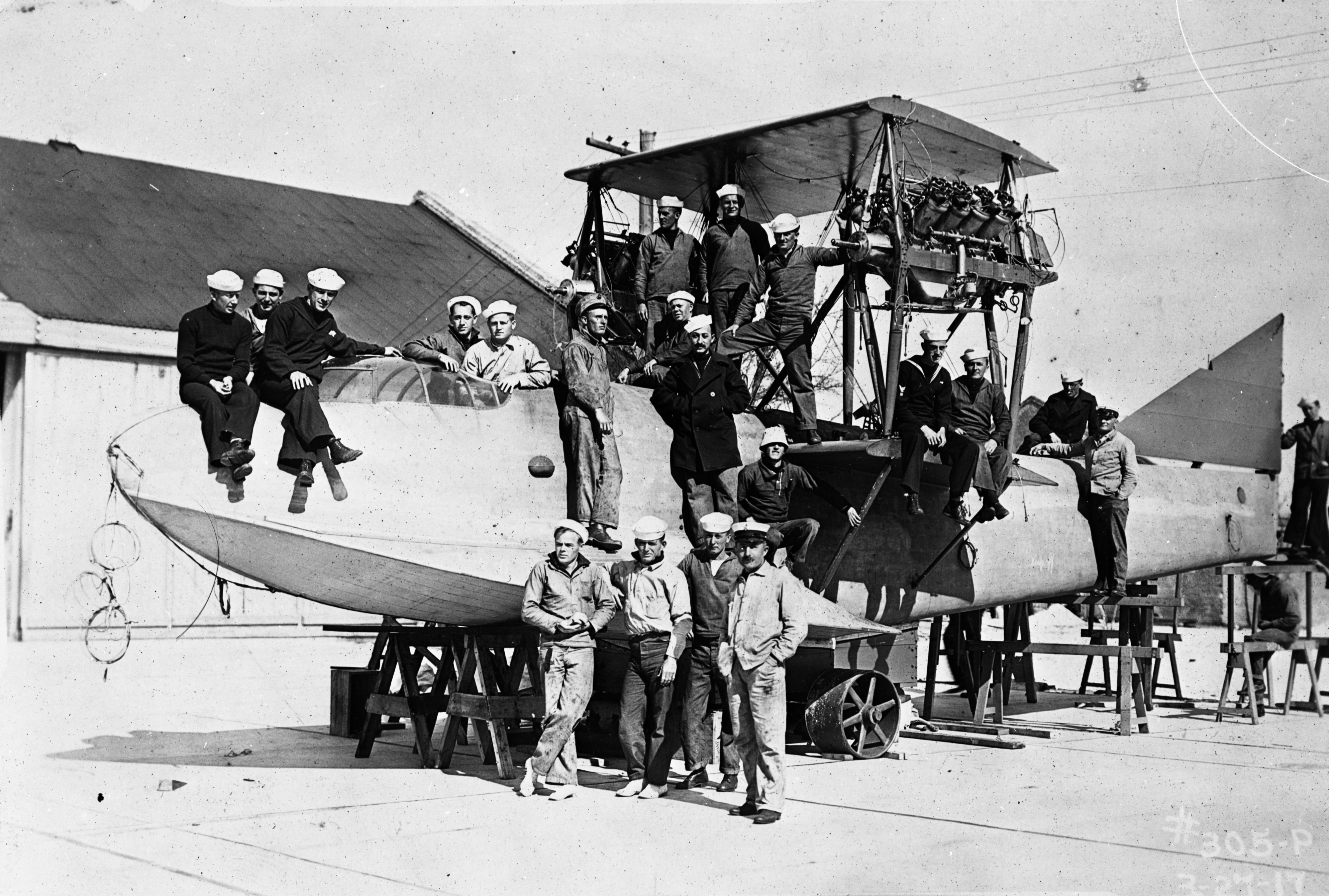Mary McLeod Bethune
Lesson Plans
Interview with Mary McLeod Bethune, ca. 1940
If any child had no shoes, I always wanted to share my shoes.
Page 7
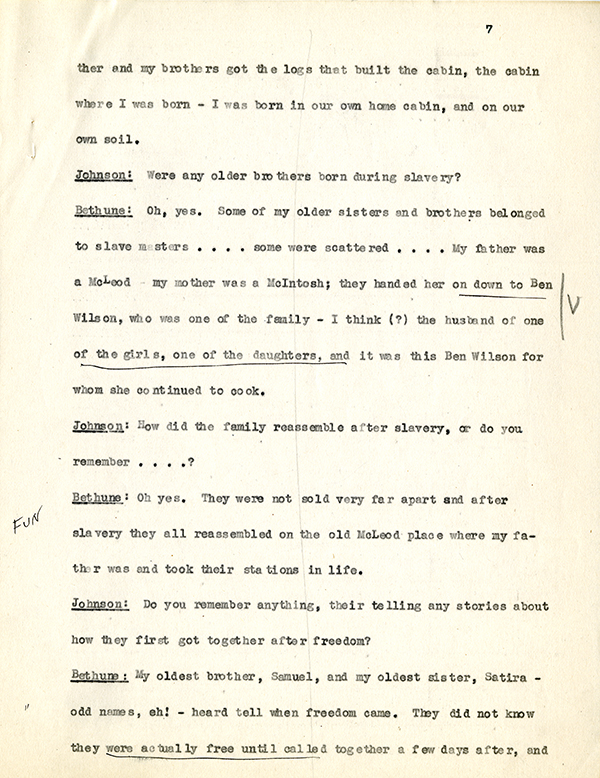
Johnson: Were any older brothers born during slavery?
Bethune: Oh, yes. Some of my older sisters and brothers belonged to slave masters….some were scattered….
My father was a McLeod – my mother was a McIntosh; they handed her on down to Ben Wilson who was one of the family – I think (?) the husband of one of the girls, one of the daughters, and it was this Ben Wilson for whom she continued to cook.
Johnson: How did the family reassemble after slavery, or do you remember.…?
Bethune: Oh, yes. They were not sold very far apart and after slavery they all reassembled on the old McLeod place where my father was and took their stations in life.
Johnson: Do you remember anything, their telling any stories about how the first got together after freedom?
Bethune: My oldest brother Samuel, and my oldest sister, Satira – odd names, eh! – heard tell when freedom came. They did not know they were actually free until called together a few days after, and they eventually found their way back to where my father was and father brought mother home on the McLeod plantation and they all assembled for a family reunion. They brought the grand children that mother and father had not seen.
Bethune: Oh, yes. Some of my older sisters and brothers belonged to slave masters….some were scattered….
My father was a McLeod – my mother was a McIntosh; they handed her on down to Ben Wilson who was one of the family – I think (?) the husband of one of the girls, one of the daughters, and it was this Ben Wilson for whom she continued to cook.
Johnson: How did the family reassemble after slavery, or do you remember.…?
Bethune: Oh, yes. They were not sold very far apart and after slavery they all reassembled on the old McLeod place where my father was and took their stations in life.
Johnson: Do you remember anything, their telling any stories about how the first got together after freedom?
Bethune: My oldest brother Samuel, and my oldest sister, Satira – odd names, eh! – heard tell when freedom came. They did not know they were actually free until called together a few days after, and they eventually found their way back to where my father was and father brought mother home on the McLeod plantation and they all assembled for a family reunion. They brought the grand children that mother and father had not seen.
Page 8
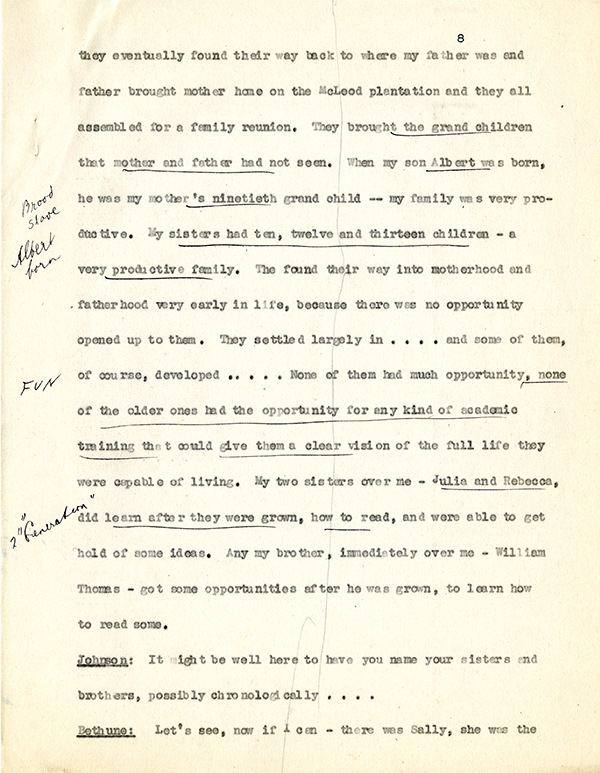
When my son Albert was born, he was my mother’s ninetieth grand child – my family was very productive. My sisters had ten, twelve and thirteen children – a very productive family. They found their way into motherhood and fatherhood very early in life, because there was no opportunity opened up to them. They settled largely in …. And some of them, of course developed….
None of them had much opportunity, none of the older ones had the opportunity for any kind of academic training that could give them a clear vision of the full life they were capable of living. My two sisters over me – Julia and Rebecca, did learn after they were grown, how to read, and were able to get hold of some ideas. And my brother, immediately over me – William Thomas – got some opportunities after he was grown, to learn to read some.
Johnson: It might be well here to have you name your sisters and brothers, possibly chronologically….
Bethune: Let’s see, now if I can – there was Sally, she was the oldest, then Satira, Samuel, Julia, Kissie, Kelly, Carrie, (all old fashioned and odd names) Beauregard (named in honor of General Beauregard), Cecelia, Rebecca, Magdalena (we called her Margie), Mary Jane (myself, of course), Mattie Bell, William Thomas, Monday (a common S.C. name)….
None of them had much opportunity, none of the older ones had the opportunity for any kind of academic training that could give them a clear vision of the full life they were capable of living. My two sisters over me – Julia and Rebecca, did learn after they were grown, how to read, and were able to get hold of some ideas. And my brother, immediately over me – William Thomas – got some opportunities after he was grown, to learn to read some.
Johnson: It might be well here to have you name your sisters and brothers, possibly chronologically….
Bethune: Let’s see, now if I can – there was Sally, she was the oldest, then Satira, Samuel, Julia, Kissie, Kelly, Carrie, (all old fashioned and odd names) Beauregard (named in honor of General Beauregard), Cecelia, Rebecca, Magdalena (we called her Margie), Mary Jane (myself, of course), Mattie Bell, William Thomas, Monday (a common S.C. name)….
Page 9
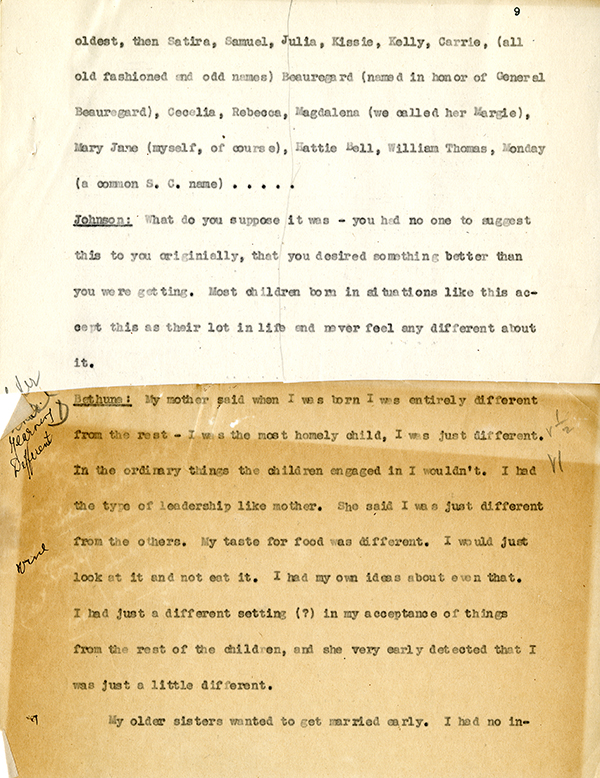
Johnson: What do you suppose it was – you had no one to suggest this to you originally that you desired something better than you were getting. Most children born in situations like this accept this as their lot in life and never feel any different about it.
Bethune: My mother said when I was born I was entirely different from the rest – I was the most homely child, I was just different. In the ordinary things the children engaged in I wouldn’t. I had the type of leadership like my mother. She said I was just different from the others.
My taste for food was different. I would just look at it and not eat it. I had my own ideas about even that. I had just a different setting (?) in my acceptance of things from the rest of the children, and she very early detected that I was just a little different. My older sisters wanted to get married early. I had no inclinations that way. I had more of a missionary spirit – the spirit of doing things for others.
Bethune: My mother said when I was born I was entirely different from the rest – I was the most homely child, I was just different. In the ordinary things the children engaged in I wouldn’t. I had the type of leadership like my mother. She said I was just different from the others.
My taste for food was different. I would just look at it and not eat it. I had my own ideas about even that. I had just a different setting (?) in my acceptance of things from the rest of the children, and she very early detected that I was just a little different. My older sisters wanted to get married early. I had no inclinations that way. I had more of a missionary spirit – the spirit of doing things for others.
Page 10
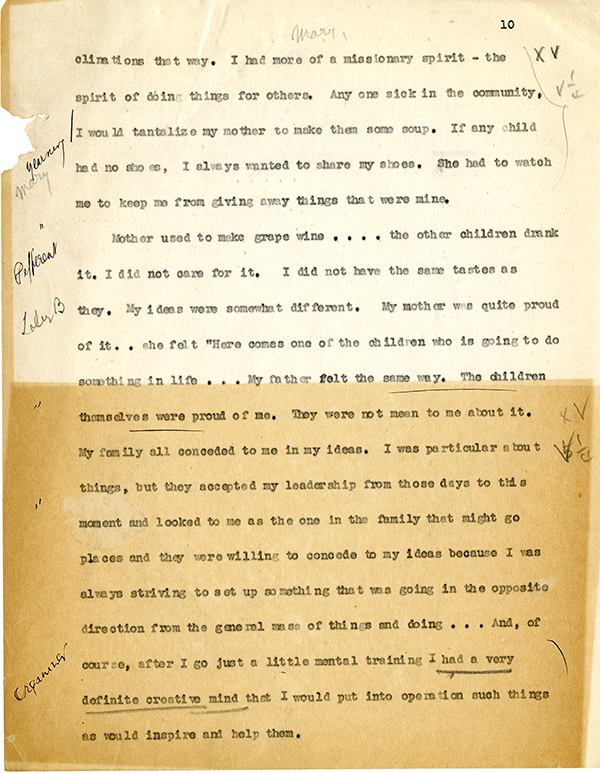
Any one sick in the community, I would tantalize my mother to make them some soup. If any child had no shoes, I always wanted to share my shoes. She had to watch me to keep me from giving away things that were mine.
Mother used to make grape wine….the other children drank it. I did not care for it. I did not have the same tastes as they. My ideas were somewhat different. My mother was quite proud of it..she felt “Here comes one of the children who is going to do something in life… My father felt the same way. The children themselves were proud of me. They were not mean to me about it. My family all conceded to me in my ideas.
I was particular about things, but they accepted my leadership from those days to this moment and looked to me as the one in the family that might go places and they were willing to concede to my ideas because I was always striving to set up something that was going in the opposite direction from the general mass of things and doing… And, of course, after I got just a little mental training I had a very definite creative mind that I would put into operation such things as would inspire and help them.
Mother used to make grape wine….the other children drank it. I did not care for it. I did not have the same tastes as they. My ideas were somewhat different. My mother was quite proud of it..she felt “Here comes one of the children who is going to do something in life… My father felt the same way. The children themselves were proud of me. They were not mean to me about it. My family all conceded to me in my ideas.
I was particular about things, but they accepted my leadership from those days to this moment and looked to me as the one in the family that might go places and they were willing to concede to my ideas because I was always striving to set up something that was going in the opposite direction from the general mass of things and doing… And, of course, after I got just a little mental training I had a very definite creative mind that I would put into operation such things as would inspire and help them.
Page 11
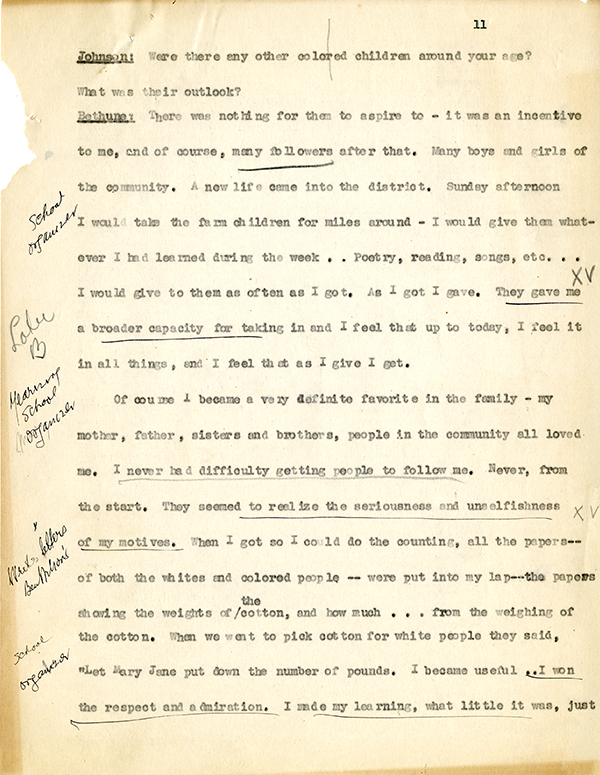
Johnson: Were there any other colored children around your age? What was their outlook?
Bethune: There was nothing for them to aspire to – it was an incentive to me, and of course, many followers after that. Many boys and girls of the community. A new life came into the district.
Sunday afternoon I would take the farm children for miles around – I would give them whatever I had learned during the week..Poetry, reading, songs, etc…I would give to them as often as I got. As I got I gave. They gave me a broader capacity for taking in and I feel that up to today, I feel it in all things, and I feel that as I give I get.
Of course I became a very definite favorite in the family – my mother, father, sisters and brothers, people in the community all loved me. I never had difficulty getting people to follow me. Never, from the start. They seemed to realize the seriousness and unselfishness of my motives.
When I got so I could do the counting, all the papers—of both the whites and colored people—were put into my lap—the papers showing the weights of the cotton, and how much…from the weighing of the cotton. When we went to pick cotton for white people they said, “Let Mary Jane put down the number of pounds.”
Bethune: There was nothing for them to aspire to – it was an incentive to me, and of course, many followers after that. Many boys and girls of the community. A new life came into the district.
Sunday afternoon I would take the farm children for miles around – I would give them whatever I had learned during the week..Poetry, reading, songs, etc…I would give to them as often as I got. As I got I gave. They gave me a broader capacity for taking in and I feel that up to today, I feel it in all things, and I feel that as I give I get.
Of course I became a very definite favorite in the family – my mother, father, sisters and brothers, people in the community all loved me. I never had difficulty getting people to follow me. Never, from the start. They seemed to realize the seriousness and unselfishness of my motives.
When I got so I could do the counting, all the papers—of both the whites and colored people—were put into my lap—the papers showing the weights of the cotton, and how much…from the weighing of the cotton. When we went to pick cotton for white people they said, “Let Mary Jane put down the number of pounds.”
Page 12
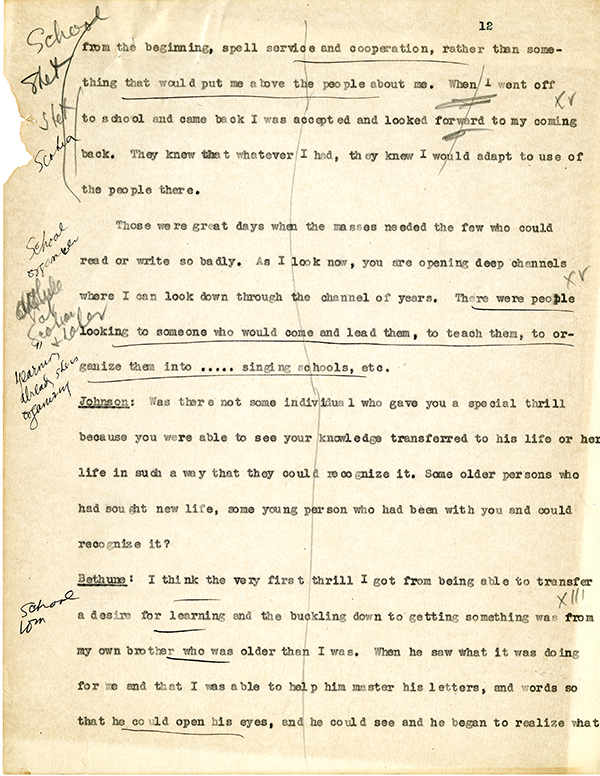
I became useful..I won the respect and admiration. I made my learning, what little it was, just from the beginning, spell service and cooperation, rather than something that would put me above the people around me.
When I went off to school and came back I was accepted and looked forward to my coming back. They knew that whatever I had, they knew I would adapt to use of the people there. Those were great days when the masses needed the few who could read or write so badly.
As I look now, you are opening deep channels where I can look down through the channel of years. There were people looking to someone who would come and lead them, to teach them, to organize them into….. singing schools, etc.
Johnson: Was there not some individual who gave you a special thrill because you were able to see your knowledge transferred to his life or her life in such a way that they could recognize it. Some older persons who had sought new life, some young person who had been with you and could recognize it?
Bethune: I think the very first thrill I got from being able to transfer a desire for learning and the buckling down to getting something was from my own brother who was older than I was.
When I went off to school and came back I was accepted and looked forward to my coming back. They knew that whatever I had, they knew I would adapt to use of the people there. Those were great days when the masses needed the few who could read or write so badly.
As I look now, you are opening deep channels where I can look down through the channel of years. There were people looking to someone who would come and lead them, to teach them, to organize them into….. singing schools, etc.
Johnson: Was there not some individual who gave you a special thrill because you were able to see your knowledge transferred to his life or her life in such a way that they could recognize it. Some older persons who had sought new life, some young person who had been with you and could recognize it?
Bethune: I think the very first thrill I got from being able to transfer a desire for learning and the buckling down to getting something was from my own brother who was older than I was.

 Listen: The Assorted Selections Program
Listen: The Assorted Selections Program